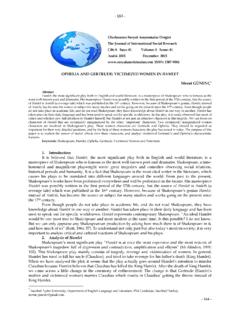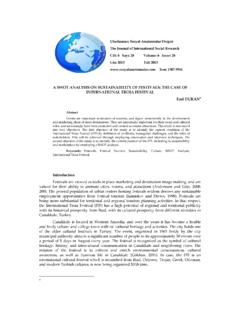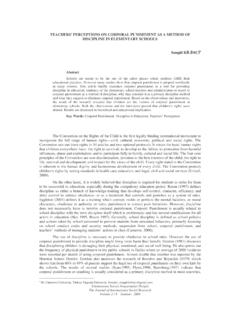Transcription of CORPORATE SOCIAL RESPONSIBILITY AND ITS …
1 CORPORATE SOCIAL RESPONSIBILITY AND ITS ROLE IN COMMUNITY. DEVELOPMENT: AN INTERNATIONAL PERSPECTIVE. Maimunah ISMAIL . Abstract CORPORATE SOCIAL RESPONSIBILITY (CSR) refers to strategies corporations or firms conduct their business in a way that is ethical, society friendly and beneficial to community in terms of development. This article analyses the meaning of CSR based on some theories available in literature. It is argued that three theories namely utilitarian, managerial and relational theories of CSR supported by works of other scholars in the area could be used to suggest that CSR becomes an international concern due to globalized nature of business that knows no border.
2 CSR is evolving in its meaning and practice. The article then discusses the role of CSR in community development because the very logic of CSR is towards seeing its impact in community socially, environmentally and economically. Competencies required by CSR managers are also analyzed in order to have a better understanding of the practical aspects of CSR. Finally, conclusions and implications for future research are discussed. Key Words: CORPORATE SOCIAL RESPONSIBILITY , community development, competencies of CSR managers, multinational corporations, CORPORATE -society relations. Introduction The issue of CORPORATE SOCIAL RESPONSIBILITY (CSR) has been debated since the 1950s. Latest analyses by Secchi (2007) and Lee (2008) reported that the definition of CSR has been changing in meaning and practice.
3 The classical view of CSR was narrowly limited to philanthropy and then shifted to the emphasis on business-society relations particularly referring to the contribution that a corporation or firm provided for solving SOCIAL problems. In the early twentieth century, SOCIAL performance was tied up with market performance. The pioneer of this view, Oliver Sheldon (1923, cited in Bichta, 2003), however, encouraged management to take the initiative in raising both ethical standards and justice in society through the ethic of economizing, economize the use of resources under the name of efficient resource mobilization and usage. By doing so, business creates wealth in society and provides better standards of living.
4 The present-day CSR (also called CORPORATE RESPONSIBILITY , CORPORATE citizenship, responsible business and CORPORATE SOCIAL opportunity) is a concept whereby business organizations consider the interest of society by taking RESPONSIBILITY for the impact of their activities on customers, suppliers, employees, shareholders, communities and other stakeholders as well as their environment. This obligation shows that the organizations have to comply with legislation and voluntarily take initiatives to improve the well-being of their employees and their families as well as for the local community and society at large. CSR simply refers to strategies corporations or firms conduct their business in a way that is ethical and society friendly.
5 CSR can involve a range of activities such as working in partnership with local communities, socially sensitive investment, developing relationships with employees, customers and their families, and involving in activities for environmental conservation and sustainability. This article aims to analyze three theories of CSR namely utilitarian, managerial and relational in terms of their meaning and practical emphases. These groups of theories are chosen because they are interdisciplinary in nature covering aspects of economic system, the managerial aspects of the corporation . Professor, Department of Professional Development and Continuing Education, Faculty of Educational Studies, Universiti Putra Malaysia Uluslararas Sosyal Ara t rmalar Dergisi The Journal of International SOCIAL Research Volume 2 / 9 Fall 2009.
6 - 200 - and the beneficiaries. The paper then highlights the role of CSR in community development based on an international perspective due to the heterogeneity of CSR in its understanding and practices in various countries of the world. The organization of the article is as follows: First, theories of CSR are analyzed in order to look at their emphases of meaning, perspective, and approaches. Second, the roles of CSR are highlighted specifically in community development because the very logic of CSR is towards seeing its impact in community socially, environmentally and economically. Third, competencies required by CSR. managers are discussed in order to have a better understanding of the practical aspects of CSR.
7 Finally, conclusions and implications for future research are drawn. Theories of CSR. Since there is a great heterogeneity of theories and approaches of CSR, discussion in this article is based on a comprehensive analysis by Secchi (2007) and it is compared with an analysis by Garriga and Mele (2004). Secchi has come up with a group of theories based on a criterion what role the theories confer to the corporation and society. The theories are as follows: 1) The utilitarian theory, 2) The managerial theory, and 3) The relational theory (see Table 1). On the other hand, Garriga and Mele's (2004) analysis maps CSR into four types of territories. They are: 1) Instrumental theories, 2) Political theories, 3).
8 Integrative theories, and 4) Ethical theories. Table 2 describes the theories and the relevant approaches. There is no doubt that some similarities do exist in both conceptualizations of CSR and the discussion will be based on emphases and approaches. Table 1: Utilitarian, managerial and relational theories of CSR. Utilitarian Theory Managerial Theory Relational Theory Theories on SOCIAL costs CORPORATE SOCIAL performance Business and society Stakeholder Functionalism SOCIAL accountability, auditing and reporting approach (SAAR) CORPORATE global citizenship SOCIAL RESPONSIBILITY for multinationals SOCIAL contract theory Source: Secchi (2007: 350). Table 2: CORPORATE SOCIAL responsibilities theories and related approaches Types of theory Approaches Short description Instrumental theories Maximization of shareholder Long term value of maximization (Focusing on achieving economic value objectives through SOCIAL activities).
9 Strategies for competitive SOCIAL investment in a competitive context advantage Firm's view on natural resources and its dynamic capabilities Altruistic activities socially recognized as Cause-related marketing marketing tool Political theories CORPORATE constitutionalism SOCIAL responsibilities of businesses arise from the (focusing on a responsible use of SOCIAL power the firms have business power in the political arena) Integrative SOCIAL contract Assumes that a SOCIAL contract between business and society exists CORPORATE citizenship The firm is understood as being like a citizen with certain involvement in the community Integrative theories Management issues CORPORATE response to SOCIAL and political issues Law and the existing public policy process are Public RESPONSIBILITY taken as a reference for SOCIAL performance Balances the interests of firms' stakeholders Searches for SOCIAL legitimacy and processes to Stakeholder management give appropriate responses to SOCIAL issues CORPORATE SOCIAL performance Ethical theories Stakeholder normative theory Considers fiduciary duties towards
10 Stakeholders of (Focusing on the right thing to achieve a the firm. This requires some moral theories good society) Universal rights Based on human rights, labor rights and respect for environment Sustainable development Aimed at achieving human development considering present and future generations The common good Oriented towards the common good of society Source: Garriga and Mele (2004: 63-64). Uluslararas Sosyal Ara t rmalar Dergisi The Journal of International SOCIAL Research Volume 2 / 9 Fall 2009. - 201 - Utilitarian Theories In the utilitarian theories the corporation serves as a part of the economic system in which the function is mechanical traditionally known as in profit maximization.

















